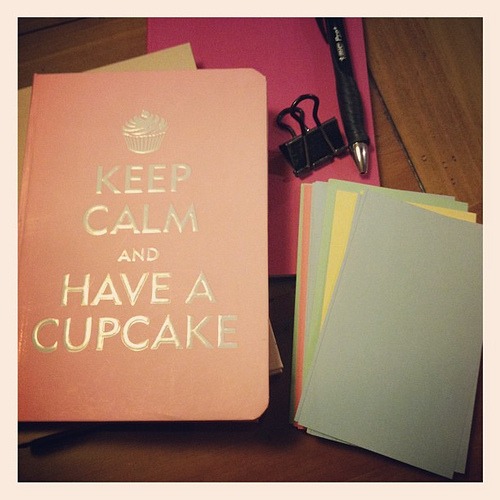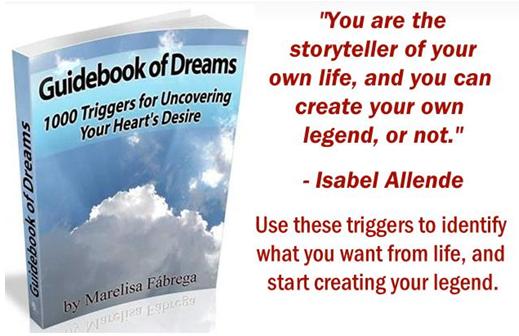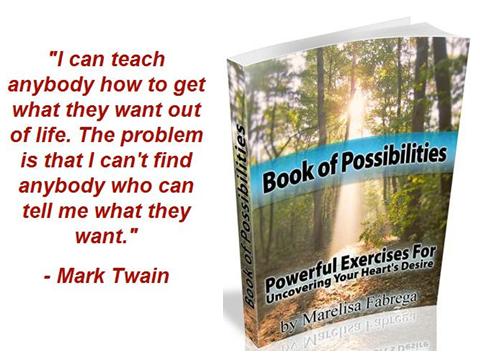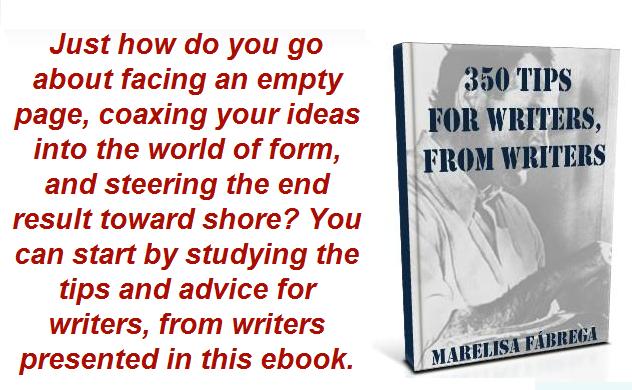 Today I came across a huge free writing guide (it has over 360,000 words), written by mystery, thriller, and horror writer J.A. Konrath. It’s titled, “The Newbie´s Guide to Publishing”.
Today I came across a huge free writing guide (it has over 360,000 words), written by mystery, thriller, and horror writer J.A. Konrath. It’s titled, “The Newbie´s Guide to Publishing”.
J.A. Konrath has gotten eight book contracts, he’s sold over 100 short stories, and he has self-published several ebooks on Kindle (he’s sold more than 25,000 copies of his self-published ebooks). I decided to look through his guide and see if I could pick out a few good writing tips. The guide did not disappoint: I found lots of gems.
Here, then, are 42 writing tips from J.A. Konrath:
1. When Konrath is working on a book, he gives himself a writing quota of between 3,500 and 4,000 words a day. In order to meet this quota, he came up with three rules which he follows religiously:
- He doesn’t automatically accept every speaking invitation he receives.
- He only turns on the internet when he takes his breaks after every 1,000 words.
- He keeps working until he reaches his quota, even if it means that he doesn’t get any sleep that night.
2. Be entertaining.
3. If you’re paralyzed with fear that your book sucks, do the following:
- When in doubt, keep writing anyway.
- Tell your internal editor to shut up until you’ve reached the end.
- Remember that you’re often a poor judge of your own work.
4. “I’m an advocate of cutting everything non-essential to the story. It’s the Kill Your Darlings School of Writing. If it ain’t needed, trim it.”
5. “Make each chapter, each paragraph, each word essential.”
6. “Well drawn characters are important in fiction. If a reader doesn’t care about the protagonist and antagonist, it doesn’t matter how many roller-coaster twists the plot has. As writers, it’s our duty to make our characters memorable.”
7. One of the best ways to motivate yourself to write is by having a game plan. That is, prepare an outline. “An outline doesn’t have to be dozens of pages long, incorporating every scene, twist, and point. It simply needs to be the framework on which you hang your story.”
8. “In my books, I try to keep raising the stakes, constantly introduce conflict (both internal and external) . . . . Each scene has to have a point, a reason for existing. It has to fulfill some kind of purpose—reveal clues, enhance character, add suspense, raise tension, ratchet up the conflict.”
9. Your protagonist has to have a goal (or goals); that is, a dream or something that they desperately want. The plot centers on your protagonist’s attempts to achieve those goals. However, you need to make sure that your protagonist doesn’t achieve his or her goals until the very end.
In the meantime, torture your protagonist as much as you can. At every turn, ask yourself: “How can I make things worse for the protagonist?” (As another writer put it, chase your protagonist up a tree and then throw rocks at them.)
10. “Make sure the first chapter starts with action.”
11. Give your character flaws. Ask the following: “What personal, internal problem will get in the way of the hero reaching his/her goals? Addiction? Illness? Disability? Neuroses?”
12. Ask yourself: “Who will make a worthy opponent for your protagonist?”
13. Create a strong villain. “Good vs. Evil is conflict in its purest form, and any sports fan can tell you that competition is a lot of fun.”
14. “Conflict is the main ingredient for successful fiction. The question of ‘What happens next?’ is what keeps your audience glued to the page. Not pretty description. Not clever phrasing. Not cute dialog. The motor that drives the story is conflict. The central plot of any story should be centered around a conflict. The sub plots should introduce more conflict. There should be conflict on every page, and even in every paragraph.”
15. “Write what you like to read.”
16. “If you want to be a writer you have to make writing a priority.”
17. “Rewriting and editing is where you take a good book and make it great by cutting out all of the fat, exposition, and unnecessary action and dialog.”
18. When writing dialogue, make it sound natural. “People talk differently than they write. Writing is slower, more deliberate, and more thought goes into it. Speaking is looser, freer, less constricting, and less precise. Record some dialog in natural settings—at the mall, on the phone, on the radio. Then transcribe what you heard. You’ll notice a big difference between the spoken word and the written word.”
19. “Read everything out loud.”
20. “Get the scissors. . . . You may have the right words, but the wrong order. Don’t be afraid to print up a manuscript and then attack it with a razor and a roll of tape. Switching chapters, paragraphs and sentences can sometimes make a good piece into a great one. Seeing your words all hacked gives you a greater freedom to manipulate them.”
21. If you feel blocked, ask your characters how they’re feeling, what they want, and what they should do next.
22. Give yourself permission to write crap. “Spend too much time thinking, questioning, judging, dismissing, and second-guessing, and you’ll never get anything finished.” You can always edit later.
23. If you’re stuck, read what you wrote the day before. This can give you a launching point for the next scene.
24. “Keep at it.”
25. “Questions keep the pages turning. The obvious question, ‘What happens next?’ is what both your characters and your readers should be thinking.”
26. Editing tip: “Put the writing away. A week is good. Two weeks is better. The longer you can stay away from it, the more you can forget what you wrote and approach it with fresh eyes.”
27. “We’re not writers. We’re rewriters. Nobody gets it right the first time. And even when you do sell it, you’ll be required to make even more changes. This is a business. Leave the ego at the door . . . and be prepared to work hard if you want to make some money in this biz.”
28. “Research shouldn’t take the place of writing, but it is certainly required if you want to paint an accurate picture in your reader’s mind.”
29. “Read like a writer. Reread passages from books you love and ask yourself, what is the author doing here that’s working so well? And if you see something that you think is bad, ask yourself, why is this bad? What could the author have done differently to make it work?”
30. Ask, “What if?” Here’s one example. “What if someone cloned dinosaurs and planned to open a dinosaur theme park on a remote island?” (Jurassic Park).
31. “Get feedback. It’s tough to write in a vacuum. As writers, we need readers. Family, friends, peers.”
32. “Seek criticism, not praise. Knowing what’s wrong will help you improve.”
33. “Read what’s currently selling, and come up with comparable ideas.”
34. “Don’t take rejection personally. This is a business, so be businesslike.”
35. Ask: “Does the story pull the reader in right away and then hold their interest?” In other words, does your story hook the reader?
36. “Short stories pay poorly, but they’re extremely important for getting your name out there. Try to send out a few every month.”
37. “Talking about writing, reading about writing, taking writing classes, and joining writing groups, discussing writing online, attending writing conventions, are not substitutes for sitting down and actually writing. Writers write.”
38. “Don’t be the writer who has ten projects going at once but never finishes any of them. Complete a project to the end.”
39. “Don’t be the writer who has a drawer full of finished manuscripts but no rejection slips because you didn’t ever send them to agents or editors. If you want to sell, you have to query.”
40. Luck plays a part in the process of getting published. However, you can improve your luck by working hard.
41. “All huge goals are simply a series of smaller goals. The pyramids were built one stone at a time. A mountain is climbed one step at a time. A bestseller is sold one book at a time.”
42. “Writing is craft, and craft can be taught.”



Related Posts:
1. 24 More Fabulous Tips For Writers, From Writers
2. 25 Ways to Be More Creative
3.57 Tips For Writers, From Writers
4. Stuck for An Idea? Try SCAMPER
5. Need Fresh Ideas? Go Streetcombing
Did you enjoy this article? Subscribe to “Daring to Live Fully” by RSS or by email, and get free updates.








 Marelisa Fabrega is a lawyer and entrepreneur. She holds a Bachelor of Science in Business Administration from Georgetown University in Washington, D.C., as well as a Juris Doctor from the Georgetown University Law Center. You can learn more about her
Marelisa Fabrega is a lawyer and entrepreneur. She holds a Bachelor of Science in Business Administration from Georgetown University in Washington, D.C., as well as a Juris Doctor from the Georgetown University Law Center. You can learn more about her 






Comments on this entry are closed.
Excellent tips. I find the one about making time to write to be very true. Chores around the house, a favorite TV show or other commitments can always wait. I set a goal of 1000 words a night and that is after working all day at a full-time job. Friends always ask me how in the world can I write a 100,000 word novel and I always tell them the same thing – one page at a time.